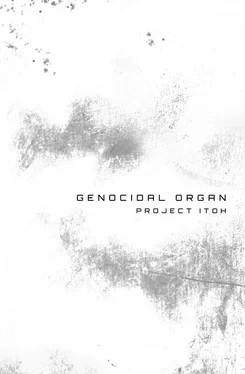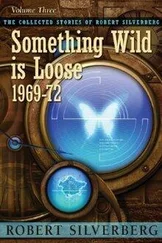Project Itoh - Genocidal Organ
Здесь есть возможность читать онлайн «Project Itoh - Genocidal Organ» весь текст электронной книги совершенно бесплатно (целиком полную версию без сокращений). В некоторых случаях можно слушать аудио, скачать через торрент в формате fb2 и присутствует краткое содержание. Год выпуска: 2012, ISBN: 2012, Издательство: Haikasoru/VIZ Media, Жанр: Старинная литература, на английском языке. Описание произведения, (предисловие) а так же отзывы посетителей доступны на портале библиотеки ЛибКат.
- Название:Genocidal Organ
- Автор:
- Издательство:Haikasoru/VIZ Media
- Жанр:
- Год:2012
- ISBN:9781421550886
- Рейтинг книги:4 / 5. Голосов: 1
-
Избранное:Добавить в избранное
- Отзывы:
-
Ваша оценка:
- 80
- 1
- 2
- 3
- 4
- 5
Genocidal Organ: краткое содержание, описание и аннотация
Предлагаем к чтению аннотацию, описание, краткое содержание или предисловие (зависит от того, что написал сам автор книги «Genocidal Organ»). Если вы не нашли необходимую информацию о книге — напишите в комментариях, мы постараемся отыскать её.
Genocidal Organ — читать онлайн бесплатно полную книгу (весь текст) целиком
Ниже представлен текст книги, разбитый по страницам. Система сохранения места последней прочитанной страницы, позволяет с удобством читать онлайн бесплатно книгу «Genocidal Organ», без необходимости каждый раз заново искать на чём Вы остановились. Поставьте закладку, и сможете в любой момент перейти на страницу, на которой закончили чтение.
Интервал:
Закладка:
Was Mom’s life recorded here in minute detail? If I were to summon up her Life Graph and order the computer to edit it into a biography, would there be a clue at the end as to what she would have wanted me to do with her now?
And then I realized how much I was focusing on physical records.
Logs. Life Graphs. Rather than worry about these external documents of Mom’s life, shouldn’t I have been thinking about the internal ones? My mother as she was inside myself, as I remembered her? And then I realized that my motive in coming to this house—to try and somehow figure out the right thing to do—was no more than procrastination. More than that—I was evading the truth.
The truth that I had no idea what my mother would have wanted.
My job was to read the psychological profiles of my targets. The NSA or the National Counterterrorism Center handed over their logs, and I read them so as to make accurate predictions regarding the likely movements and behavior of the target I was assigned to kill. And yet here I was, utterly unable to guess what my own mother would have wanted.
Even if I had been able to access my mother’s logs at that point, there wasn’t a lot I would have been able to do with the unedited raw data, and even if some program had been able to collate it into a narrative, I doubt it would have been of much use to me at this juncture. And yet I wanted those records desperately. Not because I needed a basis for my decision, but because I couldn’t bear to acknowledge that I couldn’t even make that decision on my own.
I was starting to panic. I needed to sit down. I collapsed onto the sofa.
I did love my mother. I was sure of that much.
But I was terrified. What if I also hated her? I was mortified by the possibility that there was a part of me that was repulsed by this woman who had struggled so hard to raise me, this single mother who had given me so much.
I thought of the constant gaze that had followed me around in this house. From the other side of the room. From the kitchen. The eyes that were always there, trailing me, glued to my back long after the meal was over and I had retired to my room.
I was constantly being watched. Incessantly.
I felt a flashback—of what it was like when I was a kid. In the hall, in the kitchen, in the bathroom, in the shower. Mom’s gaze was always there, penetrating. Through this gap, that crevice, from this angle. I could still visualize all the sight lines in the house. My mother wasn’t overprotective—she never coddled me. If anything, her parenting style could have been described as almost laissez-faire. I got up to the usual share of kid’s tricks, and in most ways my childhood could have been described as normal, unexceptional. The only thing that marked me as being in any way different from the other kids was the vague feeling I had that my mother’s gaze was always on the back of my head.
The house. The house where my father disappeared from this world.
The house of my mother’s gaze.
It was comforting to be watched over, and then it was suffocatingly oppressive. Two sides of the same coin.
I knew at that moment I couldn’t stay the night there. I had to leave.

Later that day I found a small motel and checked in. I told the doctor that my mother wasn’t the sort of person to have prepared a will.
The doctor laid it out for me. “If your mother gave no instructions for her terminal care, and given that she was not religious, the choice falls to you. You are going to have to decide whether or not to continue her life-support treatment.”
I spent a day on the ward with my mother, staring at her face, quietly, agonizingly trying to work out the answer. What would Mom do? What would Mom want me to do?
That was when I asked if my mother was in pain, and the doctor explained that it was not so much a case of if she was in pain but whether she was still able to feel pain. Furthermore, the doctor explained, it wasn’t clear to him where the precise line was where we couldn’t continue referring to my mother as “her” or “she.”
How many of the cerebral cortex modules that determined a person’s personality and consciousness needed to remain intact for you to refer to them as the same person? What “she” would have wanted? We had no way of vicariously experiencing my mother’s current mental state. So the question “Is she in pain?” was inadequate on so many levels. Did “she” still remain “she” in a meaningful sense? Could the nerve receptors that remained alive in her brain receive pain stimulus? Did “she” experience that stimulus in the form of pain as we know it?
The doctor was up front with me: he didn’t have the answers to any of these questions.
“Isn’t there someone who can decide for me?” I asked. I’m sure I was sobbing.
I was afraid. I had no idea what this doctor was trying to do. How could I make such an important decision when it was such a gray area?
It wasn’t the doctor’s fault, of course. We were now in the realm of philosophy, not medicine. And yet, frustratingly, modern technological developments were all useless when it came to the realm of philosophy. Technology could analyze and dissect human beings so well, but philosophy just didn’t want to know.
And I didn’t want to know. I didn’t want to decide. I realized this might have seemed selfish—hypocritical, even—given the number of people I’d sent to their deaths. But when it comes to someone close, someone you love, you lose your mind. No one tells you of the huge, ambiguous gulf between the lands of the living and the dead. I longed for the days when we had that simple, black-and-white phrase: “brain dead.”
I returned to the motel, where I cried some more. I cried for the world that had gone past the point of no return in creating this awful ambiguity between life and death. I cried in terror. I cried at the prospect of having to decide, on the sheer harshness and cruelty of my position. I cried so much I felt nauseated. I fell prostrate on the bed, crying until I needed to run to the bathroom to dry-heave my guts out, and all that emerged was saliva and more tears.
At the end of the night I had decided what to do.
However difficult the question, when it came down to it there were only two alternatives, and I had to pick one of them.

I barely even skimmed over the letter of consent to terminate treatment.
I gave my consent where consent was needed, and my mother’s life support was switched off. The doctor asked me how I felt and offered the services of a recommended counselor. Yep, sure enough, it was the counselors again. Marriage on the rocks? About to head into battle? Relative just died? Counseling was the panacea, it seemed.
“No thanks. But I appreciate the offer.”

Basically, I was worn out.
I realized this at the funeral service. I’d worn myself out thinking about all the details, and that was why I’d been able to make my decision. If I hadn’t been so exhausted, I might have still been at the hospital, sitting with Mom and her life-support systems, still turning over the options in my head.
At the time I had convinced myself that I was thinking of Mom’s best interests when I pulled the plug. When I pressed my fingerprint down on the device to give my consent, I believed that Mom wouldn’t have wanted a grim half-existence, that she would have wanted to be either alive or dead, one way or another, and that if she had been alive she would have been in terrible pain.
Читать дальшеИнтервал:
Закладка:
Похожие книги на «Genocidal Organ»
Представляем Вашему вниманию похожие книги на «Genocidal Organ» списком для выбора. Мы отобрали схожую по названию и смыслу литературу в надежде предоставить читателям больше вариантов отыскать новые, интересные, ещё непрочитанные произведения.
Обсуждение, отзывы о книге «Genocidal Organ» и просто собственные мнения читателей. Оставьте ваши комментарии, напишите, что Вы думаете о произведении, его смысле или главных героях. Укажите что конкретно понравилось, а что нет, и почему Вы так считаете.












